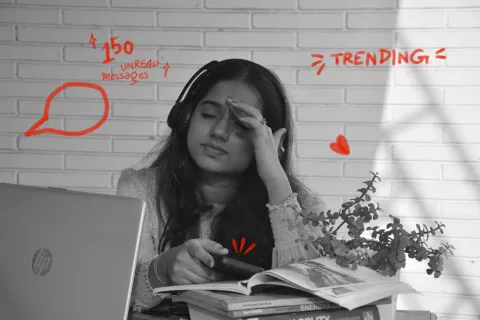Social media is an integral part of young people’s lives today. It is where they connect with friends, learn, share experiences and find information on the issues that matter to them.
For many young people in South Asia, online communities have transformed into virtual spaces that provide a sense of belonging many may not always enjoy in the physical world.
This is often most important for young people who feel alone or isolated, including young people with visual or hearing disabilities and those seeking support on issues that might be a taboo — like depression, anxiety, sexuality, gender expression and domestic violence.
However, as the popularity of social media grows, so have the threats to young people. Cyberbullying, sexual harassment, lack of control over one’s own privacy, and constant exposure to unrealistic views of other people’s curated lives – all these and other underlying risks now threaten young people’s safety, mental health and self-esteem (especially girls).
At the same time, social media platforms are not designed to fully support young people’s well-being. Social media scrolling can quickly become addictive, causing sleep disruption, heightened anxiety and depression, and low performance in school.
As a parent or caregiver, it’s important to understand the benefits and risks of social media and talk about them with your teen.
You can help them develop healthy digital habits that let them enjoy the benefits of the digital world while keeping them safe and well when online.
Here are some tips:
-
Talk to them about how social media works and how it makes them feel
-
Start with the positives. Ask them what they enjoy about going online and show that you value their opinion. Don’t dismiss what they enjoy. You don’t want to put them off talking to you about their online life.
-
Talk about the different ways social media can make them feel. This can help them better understand their emotions and how social media can alter them.
-
Remind them that the things other people post are never a full picture of their whole life. Explain that no one’s life is perfect and it’s not healthy (or realistic) to compare themselves to what they see online.
-
Talk to them about gossiping, spreading rumours or bullying and similar negative behaviours that can harm them and/or others.
>> Advice and conversation starters for talking to your child about staying safe online.
-
Talk about what is safe to share on social media and how to protect their privacy online
-
Talk to them about safe and age-appropriate alternatives to commonly used platforms (such as YouTube Kids and Messenger Kids for younger children). More child-friendly apps by age group can be found here.
-
Remind them to never share their personal information or other people’s (including their full name, address, email, phone number or real-time location) with anyone while online.
-
Learn together with your teenager about using safety features such as Safe Search on browsers and search engines. Carve out time at regular intervals to help your teen check and update the profile and privacy settings of all social media accounts. This will ensure they are not sharing unwanted or personal information online, especially with people they do not know.
-
Encourage them to always follow the “Think before you post” and the “Do no harm” approaches before posting anything online. Explain to them that the digital footprint they leave every time they browse, post or interact online can be permanent and can have consequences for themselves and others.
-
Explore using parental control applications and settings on your teen’s device if needed.
>> More information on using parental controls.
-
Let them know they can come to you at any time if they need help or feel unsafe
-
Tell them that they should always come to you if they feel unsafe, uncomfortable, sad, or don’t know what to do.
-
Tell them to come to you if someone they only know online asks to meet up or share personal information or images.
-
If your child comes to you with a concern, try to remain calm and curious. Don’t blame or criticise them. Reassure them you are there to help.
>> More information on cyberbullying and what to do if it happens.
-
Help them to develop routines that limit their screen time and social media use
-
Encourage healthy routines, including regular bedtimes, that avoid screen time at least an hour before bed.
-
Make bedrooms phone and device-free zones, especially at night.
-
Ask them to put away their devices during activities, mealtimes and homework, so they are not distracted and can be fully present.
-
Encourage and support them to hang out with their friends in person.
-
Lead by example and limit your own use of social media.
-
Use options like ‘do not disturb’ or ‘night mode’ on devices to reduce notifications and encourage them to do the same.
-
Support them to improve the quality of the time they spend online
-
Discuss and agree on how much time your teenager can spend online. Break it down by the time they spent on different activities — including social media, chatting with friends, educational content, and homework.
-
Encourage them to be aware of how being online makes them feel. You can also encourage them to keep track of their feelings by writing it down in a journal.
-
Make sure they understand how important it is to take regular screen breaks. They may need support in doing this through timers, reminders or an app to count their screen time.
-
Suggest your teen unfollows pages and accounts that make them feel bad and instead follow ones that make them feel good.
>> More tips for better mental health online.
Remember:
-
It’s important to engage with your teenager regularly and proactively regarding their online lives.
-
Make sure you listen without judgement to help you build a relationship of open communication.
-
Model values and behaviours yourself. Children and teens are more likely to display respect, empathy, critical thinking and conflict resolution if they see you doing the same.
When needed, contact an expert if you have any concerns about your child’s well-being or online life.
Child helplines are also available across South Asia for children to call and talk confidentially to a trained counsellor.






